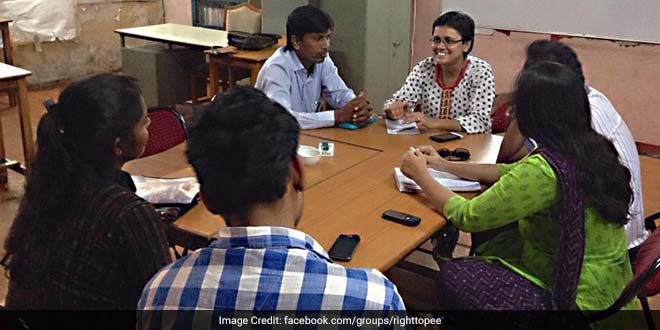Highlights
- The Right to Pee campaign demands proper sanitation spaces for women
- Mumbai is highly lacking in toilets and urinals for women
- The campaign has been successful in bringing the issue to the municipality
Mumbai, the city of dreams, the city that never sleeps, the city where women are fighting for their ‘Right to Pee.’ While the past few decades have seen a phenomenal rise in the number of women joining the workforce, public infrastructure has not kept the same pace. According to the 2011 census, there were 57,41,632 women living in Mumbai, and just 381 public toilets. Simply put, that is one public toilet for about 15,000 women. This is in stark contrast to the 6568 toilets and 2849 urinals that Mumbai offers to its male population.
Out of this blatant gender bias in urban planning, a new women’s movement was born. It simply called itself the ‘Right to Pee’ campaign and covered in its vision a fight for more public toilets and amenities for women.
I heard various reports of how inadequate the sanitation facilities for women were in Mumbai. When we tried to bring this to the attention of the municipal authorities, I witnessed their apathy towards women. Illogical questions were asked about why women need sanitation facilities. It was then that we decided to come up with the campaign. It was the idea of non-recognition of women in public spaces, that we were up against, said Sucheta Khandekar, co-founder, CORO and one of the brains behind RTP.
RTP was the brainchild of the NGO CORO in collaboration with 33 non-profit organisations. The campaign works closely with the Brihanmumbai Municipal Corporation (BMC) to discuss issues and formulate policy. They started out focusing on toilets and urinals for women in the public sphere. Today they are asking for multi-storied sanitation spaces with changing rooms, bathrooms and toilets accessible to all women.
Also Read: No Toilet, No Bride: Haryana Sarpanch’s Pro-Women, Pro-Swachh India Message
As the campaign gained momentum, the gendered dimensions became more explicit because women and their right to sanitation facilities were never prioritised by the municipality, a mostly male dominated space. Questions were also raised by municipal members on women’s need to access public toilets, thus justifying their apathy. The LGBT community too was included in the campaign, which made it holistic in nature.
The idea of beginning the campaign was to initiate discussions on a topic which is usually considered a taboo. We are glad that the campaign has been able to make the topic a talking point. We look at the campaign as a rights campaign. When we are moving ahead towards city rights, we are looking at gender friendly sanitation spaces and budgetary provisions for such spaces. We are walking collectively towards securing rights and will continue to do so, said Supriya Sonar, an activist with the Right to Pee campaign.
The campaign does not restrict itself to the urban or elite, as the concept of reclaiming the city for rights is applicable to all. While the urban elite often access toilets at malls and hotels, that is not a viable option for every woman out there. What happens to the woman selling you pens at the traffic light, or the woman you buy your vegetables for? What does she do for the 8 to 10 hours she is outside her house?
The campaign has been successful in cutting across the class and caste divide. The fact that women needed access to public toilets and urinals irrespective of their class or reason to go out in the public was the core idea behind the campaign. The campaign has also been instrumental in making the authorities such as BMC more gender sensitive and make budgetary provisions for more toilets and urinals, added Khandekar.
The campaign had a highly positive impact on the BMC’s attitude towards toilet construction with the municipal body allocating gender-specific funds over the past few years.
In 2016, a 10-member committee consisting of Solid Waste Management authorities and Right to Pee Campaign activists was formed to review the existing sanitation situation in 24 wards of Mumbai. 96 locations were given No Objection Certificates (NOCs) for gender friendly toilet construction. Brihanmumbai Electricity Supply and Transport (BEST) also gave NOCs to 55 locations in their depots for toilet construction.
The campaign is now in process of forming ward level committees jointly with BMC in the 24 wards of Mumbai. The BMC has also asked RTP campaigners for inputs into the city’s Development Plan 2034, in which three plots of land have been reserved for women’s toilets. The campaign is also looking to go to other parts of Maharashtra to campaign for gender friendly toilets and urinals in public spaces.
We worked with the Right to Pee campaign in three stages- understanding the issues, formulating policies and trying to implement them. The campaign helped us to understand key statistics with regard to toilets, such as numbers, locations, accessibility and maintenance. The plan that has been put forward to the Mumbai municipal corporation now has changed the term public toilet to a public convenience block, with multistoried buildings with changing rooms, bathrooms and toilets, said Prachi Merchant, Urban Planner, All India Institute of Local Self-Government, who is working together with RTP and the BMC to formulate better urban sanitation plans.
Also Read: Mumbai’s Brihanmumbai Municipal Corporation Launches Mobile App To Locate Toilets































